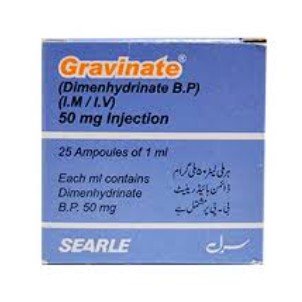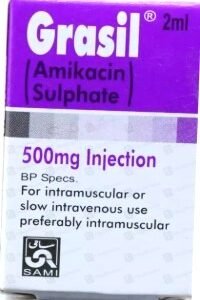Description
Gravinate Injection 1ml is a trusted pharmaceutical formulation specifically designed to combat severe vertigo, nausea, and vomiting associated with vestibular disorders. This injectable solution offers rapid therapeutic action, making it a critical tool in clinical and hospital settings for patients requiring immediate relief from debilitating dizziness and motion sickness. It is a reliable choice for healthcare providers seeking a fast-acting and effective intervention.
This anti-vertigo medication is engineered for precision and safety, offering a range of patient benefits.
-
✅ Rapid Onset of Action for quick symptom relief.
-
✅ Targeted Therapy for vestibular system disorders.
-
✅ Pre-measured 1ml Dosage for accurate administration.
-
✅ High Purity Standards manufactured in GMP-certified facilities.
-
✅ Trusted Formula backed by extensive clinical use.
What are the Primary Uses and Key Features of Gravinate Injection?
Gravinate Injection is prescribed for managing conditions related to the inner ear and balance system. Its key features are centered on providing rapid, reliable relief.
Primary Therapeutic Uses of This Anti-Vertigo Medication
-
Management of Vertigo: Effectively treats the sensation of spinning or dizziness caused by Meniere’s disease, labyrinthitis, and other vestibular pathologies.
-
Control of Nausea and Vomiting: Provides potent relief from nausea and emesis triggered by motion sickness or post-operative recovery.
-
Adjunct Therapy: Used alongside other treatments to manage symptoms in patients undergoing procedures that may disrupt equilibrium.
Defining Features and Patient Benefits
-
Fast-Acting Formula: As an injectable, it bypasses the digestive system, delivering the active ingredient directly into the bloodstream for quicker results than oral tablets.
-
Precise Dosing: Each vial contains a single, sterile 1ml dose, eliminating measurement errors and ensuring consistent delivery.
-
High Bioavailability: The intravenous or intramuscular route offers superior bioavailability, meaning a higher proportion of the drug reaches the systemic circulation.
-
Clinically Proven Efficacy: The active ingredient, Meclizine Hydrochloride, has a long-standing history of efficacy in managing vestibular symptoms.
What is the Active Ingredient in Gravinate Injection?
The therapeutic power of Gravinate Injection comes from its primary active component.
Detailed Ingredient Profile
-
Active Pharmaceutical Ingredient (API): Meclizine Hydrochloride. This is the core compound responsible for the drug’s anti-vertigo and anti-emetic effects.
-
Excipients: The formulation includes inactive ingredients such as Water for Injection, sodium chloride, and potentially buffers to maintain pH and sterility. The exact composition of non-active components may vary slightly by manufacturer but is always within pharmacopoeial standards.
How Does Meclizine Hydrochloride Work?
Meclizine Hydrochloride is classified as an antihistamine and an anticholinergic agent. It exerts its therapeutic effect by blocking histamine H1 receptors and muscarinic receptors in the brain, particularly in the vomit center and the vestibular apparatus. This blockade reduces the overstimulation of nerves responsible for triggering dizziness, nausea, and vomiting, thereby restoring a sense of balance and comfort.
How is Gravinate Injection Administered Correctly?
Proper administration is crucial for safety and efficacy. This injection is strictly for parenteral use under medical supervision.
Step-by-Step Guide for Healthcare Professionals
-
Verification: Confirm the patient’s identity, check the product name, strength, and expiration date.
-
Inspection: Visually inspect the vial for any particulate matter or discoloration before use. Do not use if the solution is not clear.
-
Aseptic Technique: Using a sterile syringe and needle, withdraw the entire 1ml solution from the vial.
-
Route of Administration: Administer via deep intramuscular (IM) injection or as directed by a physician. Intravenous (IV) administration may be performed under specific medical guidance.
-
Post-Injection Care: Apply gentle pressure at the injection site. Monitor the patient for any immediate adverse reactions.
What is the Recommended Dosage of Gravinate Injection?
Dosage must be individualized based on the patient’s condition, age, and clinical response.
Standard Gravinate Injection Dosage Guidelines
| Patient Profile | Recommended Dosage | Frequency | Maximum Daily Dose |
|---|---|---|---|
| Adults | 1ml (25mg Meclizine HCl) | Every 24 hours as needed | Typically 1 injection (25mg) |
| Geriatric Patients | May require a lower dose | To be determined by physician | Based on renal/hepatic function |
Note: This is a general guideline. The attending physician’s prescription always takes precedence. Dosage for pediatric patients is determined by a pediatrician based on weight and clinical necessity.
What Precautions Should Be Taken Before Using Gravinate Injection?
Certain conditions and concomitant drug use require careful evaluation before administering this medication.
Critical Warnings and Contraindications
-
Hypersensitivity: Do not use in patients with a known allergy to Meclizine Hydrochloride or any other components of the formulation.
-
Pregnancy and Lactation: Consult a physician. The use during pregnancy or breastfeeding is only advised if the potential benefit justifies the potential risk to the fetus or baby.
-
Underlying Medical Conditions: Use with caution in patients with glaucoma, prostate enlargement, urinary retention, or respiratory conditions like asthma.
-
Drug Interactions: Inform your doctor if you are taking sedatives, tranquilizers, or other central nervous system depressants, as Meclizine may enhance their effects.
What are the Potential Side Effects of Gravinate Injection?
Like all medicines, this drug can cause side effects, although not everybody gets them.
Common and Serious Adverse Reactions
-
Common Side Effects: Drowsiness, dry mouth, blurred vision, and mild headache are frequently reported but are often transient.
-
Less Common Side Effects: These may include fatigue, nausea, vomiting, or dizziness.
-
Serious Side Effects (Seek immediate medical help): Allergic reactions (rash, itching, swelling, difficulty breathing), palpitations, severe confusion, or difficulty urinating. These are rare but require prompt medical attention.
How Should I Store Gravinate Injection Vials?
Proper storage is essential to maintain the sterility and potency of the product.
Optimal Storage Conditions for Stability
-
Temperature: Store in a cool, dry place at room temperature, away from direct sunlight and moisture. Do not freeze.
-
Container: Keep the vials in their original packaging until ready for use to protect from light.
-
Access: Keep out of reach and sight of children and pets.
-
Expiry: Do not use the injection after the expiration date printed on the packaging.
Who is the Manufacturer of Gravinate Injection?
Gravinate Injection is manufactured by Gamma Pharmaceuticals Ltd., a reputable company known for its commitment to quality and adherence to global pharmaceutical standards. Their manufacturing facilities are certified for Good Manufacturing Practices (GMP), ensuring that every batch of the product meets stringent criteria for purity, safety, and efficacy. This corporate commitment to quality control provides a strong trust and authority signal for healthcare providers and patients.
What are the Comprehensive Health Benefits of Using Gravinate Injection?
This medication offers significant advantages for patients suffering from specific conditions.
Clinical Advantages and Patient Outcomes
-
Rapid Symptom Control: Provides fast relief from acute vertigo attacks, allowing patients to regain functional balance quickly.
-
Improved Quality of Life: By controlling debilitating dizziness and nausea, it enables patients to perform daily activities without interruption.
-
Reduced Hospital Stay: In post-operative or acute care settings, effective management of nausea and vomiting can contribute to a shorter recovery period.
-
Reliable Prophylaxis: Can be used to prevent motion sickness in susceptible individuals before travel.
-
Well-Established Safety Profile: Meclizine HCl has been used for decades, and its side effect profile is well-documented and generally manageable.
How Does Gravinate Injection Compare to Other Vertigo Treatments?
Understanding its position in the therapeutic landscape helps in making informed decisions.
Gravinate Injection vs. Common Alternatives
| Feature | Gravinate Injection (Meclizine HCl) | Oral Antihistamines (e.g., Cinnarizine) | Benzodiazepines (e.g., Diazepam) |
|---|---|---|---|
| Speed of Action | Very Fast (minutes) | Slow (30-60 minutes) | Fast |
| Primary Use | Vertigo, Nausea, Motion Sickness | Vertigo, Motion Sickness | Anxiety, Sedation (off-label for vertigo) |
| Route | Intramuscular/Intravenous | Oral | Oral, IV |
| Drowsiness | Moderate to High | Moderate | High |
| Best For | Acute, severe episodes | Mild to moderate, prevention | Vertigo with significant anxiety component |
Frequently Asked Questions About Gravinate Injection
How long does it take for Gravinate Injection to work?
Patients often begin to feel the effects within 30 minutes of administration, with peak effectiveness occurring within one to two hours. The rapid onset is a key advantage of the injectable form.
Can Gravinate Injection make you sleepy?
Yes, drowsiness is a very common side effect. Patients are advised not to drive, operate heavy machinery, or engage in activities requiring mental alertness for several hours after receiving the injection.
Is Gravinate Injection safe for elderly patients?
While it can be used, extra caution is warranted. Elderly patients are more susceptible to side effects like confusion, dizziness, and sedation. A physician will determine the appropriate dose, which may be lower than the standard adult dose.
What is the difference between Gravinate tablet and injection?
The primary difference is the route of administration and speed of onset. The injection works much faster, making it suitable for emergency or severe cases, while tablets are more convenient for long-term management or prevention.
Can I self-administer Gravinate Injection at home?
No. Gravinate Injection is a prescription-only medication intended for administration by qualified healthcare professionals in a clinical setting. Self-injection is not recommended due to risks of improper technique, infection, and inability to manage potential adverse reactions.

 Cart is empty
Cart is empty 




Reviews
There are no reviews yet.